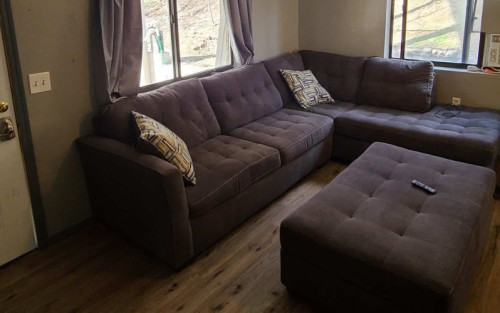






Blueprints for Recovery
Treatment Focus
This center treats mental health conditions and co-occurring substance use. You receive collaborative, individualized treatment that addresses both issues for whole-person healing.
Primary Level of Care
Offering intensive care with 24/7 monitoring, residential treatment is typically 30 days and can cover multiple levels of care. Length can range from 14 to 90 days typically.
Claimed
Recovery.com has connected directly with this treatment provider to validate the information in their profile.
Treatment Focus
This center treats mental health conditions and co-occurring substance use. You receive collaborative, individualized treatment that addresses both issues for whole-person healing.
Primary Level of Care
Offering intensive care with 24/7 monitoring, residential treatment is typically 30 days and can cover multiple levels of care. Length can range from 14 to 90 days typically.
Provider's Policy
At Blueprints for Recovery, we know that it can be challenging to understand how your insurance policy works. It can also be difficult to understand your rights and know when your insurance provider isn’t looking out for you like they should. We have helped many clients work with their insurance companies to establish the importance of mental health treatment and substance abuse recovery programs and get the financial assistance they need. If you or a loved one is struggling with addiction, we can help you achieve sobriety. Allow us to come alongside you and help you find the best solution for your struggle, your insurance policy, and your restorative treatment.
Blueprints for Recovery
Blueprints for Recovery
About Blueprints for Recovery
3 Phase Approach
In Northern Arizona, Blueprints to Recovery supports men and women with gambling addiction and co-occurring mental health disorders. With the help of a tailored treatment plan, clients can address trauma, learn new skills, build support networks, and set goals for their recovery. Blueprints to Recovery’s transitional treatment stage provides additional support as clients adjust to their new lifestyles. Clients still have up to 30 hours of therapy each week as they transition out of treatment. Finally, clients apply what they have learned to their lives during the launch phase. A continuing care coordinator helps clients develop and hone the skills they will need to begin their new lives.
Experiential Therapies In Prescott’s mountains
Northern Arizona's mountainous deserts surround Blueprints to Recovery. The setting offers a lovely environment for healing and connecting with nature. Blueprints to Recovery offers experiential therapies like biking, hiking, canoeing, kayaking, and boating, to name a few.
Experienced And Compassionate Staff
Most staff members, including the founder, have been through treatment and recovery. Their experience allows a deeper connection with clients and fosters a comfortable, understanding environment. The team is happy to answer questions and share their own personal experiences.
Blueprints to Recovery is in-network with several major insurance companies, like Humana, Blue Cross Blue Shield, and Cigna.
Center Overview
Treatment Focus
This center treats mental health conditions and co-occurring substance use. You receive collaborative, individualized treatment that addresses both issues for whole-person healing.
Joint Commission Accredited
The Joint Commission accreditation is a voluntary, objective process that evaluates and accredits healthcare organizations (like treatment centers) based on performance standards designed to improve quality and safety for patients. To be accredited means the treatment center has been found to meet the Commission's standards for quality and safety in patient care.
Insurance Accepted
Cash Pay Rates
Estimated Cash Pay Rate
Center pricing can vary based on program and length of stay. Contact the center for more information. Recovery.com strives for price transparency so you can make an informed decision.
Levels of Care




Your Care Options
Specializations
Adventure Therapy
This experiential approach uses the physical and emotional challenges of outdoor activities as tools for personal growth.
Gambling
Excessive, repetitive gambling causes financial and interpersonal problems. This addiction can interfere with work, friendships, and familial relationships.
Who We Treat
Men and Women
Men and women attend treatment for addiction in a co-ed setting, going to therapy groups together to share experiences, struggles, and successes.
Approaches
Twelve Step
Incorporating spirituality, community, and responsibility, 12-Step philosophies prioritize the guidance of a Higher Power and a continuation of 12-Step practices.
Experiential
Expressive tools and therapies help patients process past situations, learn more about themselves, and find healing through action.
Holistic
A non-medicinal, wellness-focused approach that aims to align the mind, body, and spirit for deep and lasting healing.
Individual Treatment
Individual care meets the needs of each patient, using personalized treatment to provide them the most relevant care and greatest chance of success.
Therapies
Spiritual Care
Tending to spiritual health helps treatment become more effective, allowing patients to better cope with their emotions and rebuild their spiritual wellbeing.
Adventure Therapy
This experiential approach uses the physical and emotional challenges of outdoor activities as tools for personal growth.
Motivational Interviewing and Enhancement Therapy (MET)
This approach is based on idea that motivation to change comes from within. Providers use a conversational framework that may help you commit to recovery.
Somatic Experiencing
This method treats emotional trauma stored in the body. A therapist helps patients work through the physical feelings associated with emotional pain.
Meditation & Mindfulness
A practiced state of mind that brings patients to the present. It allows them to become fully aware of themselves, their feelings, and the present moment.
Eye Movement Therapy (EMDR)
Lateral, guided eye movements help reduce the emotional reactions of retelling and reprocessing trauma, allowing intense feelings to dissipate.
Motivational Interviewing
Based on the idea that motivation to change comes from within, providers use a conversational framework to discover personalized methods for change.
Conditions We Treat
Gambling
Excessive, repetitive gambling causes financial and interpersonal problems. This addiction can interfere with work, friendships, and familial relationships.
Substances We Treat
Co-Occurring Disorders
A person with multiple mental health diagnoses, such as addiction and depression, has co-occurring disorders also called dual diagnosis.
Languages
Aftercare
Care Designed for Your Needs
Special Considerations
Transition Program
Patients in a transition program gradually return to life outside treatment, helping lower chances of relapse and continue care in a less intense setting.
Off-Site Activities
What people are saying
Treatment
4.6
Accommodations
4.7
Food & Nutrition
4.8
Value
4.8
Ryan Weaver
Reviewed 01/09/24
Review from Rehabs.com
HH
Reviewed 02/19/16
Review from Rehabs.com
PC
Reviewed 02/19/16
Review from Rehabs.com
CB
Reviewed 02/19/16
Review from Rehabs.com
Melissa
Reviewed 02/12/15
Review from Rehabs.com





